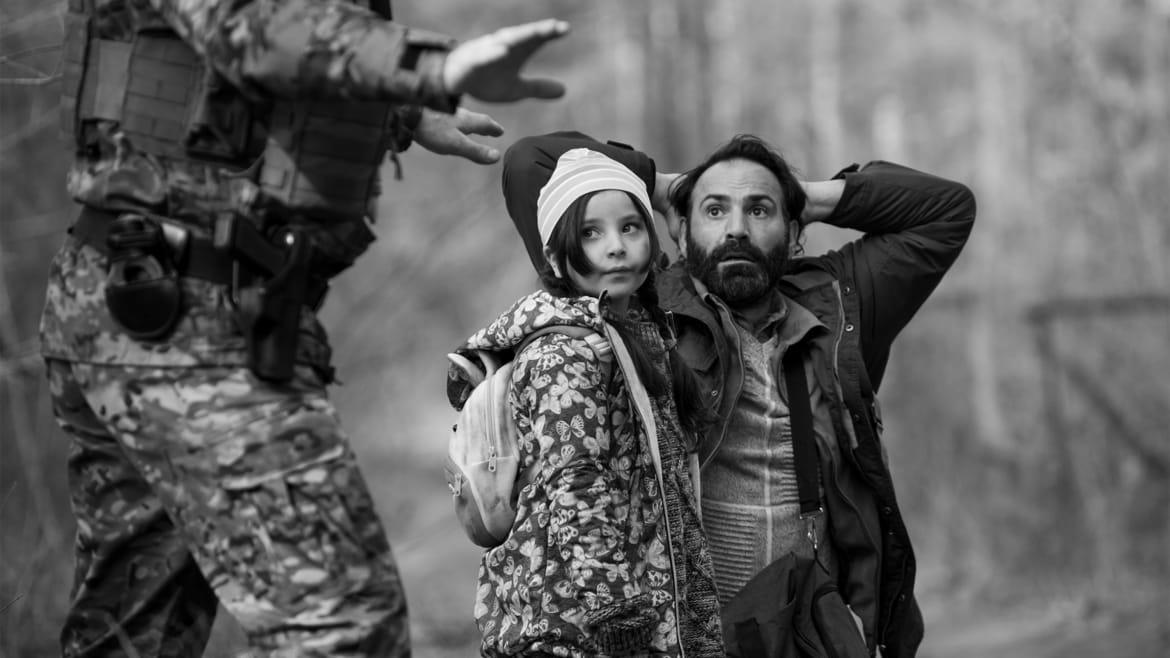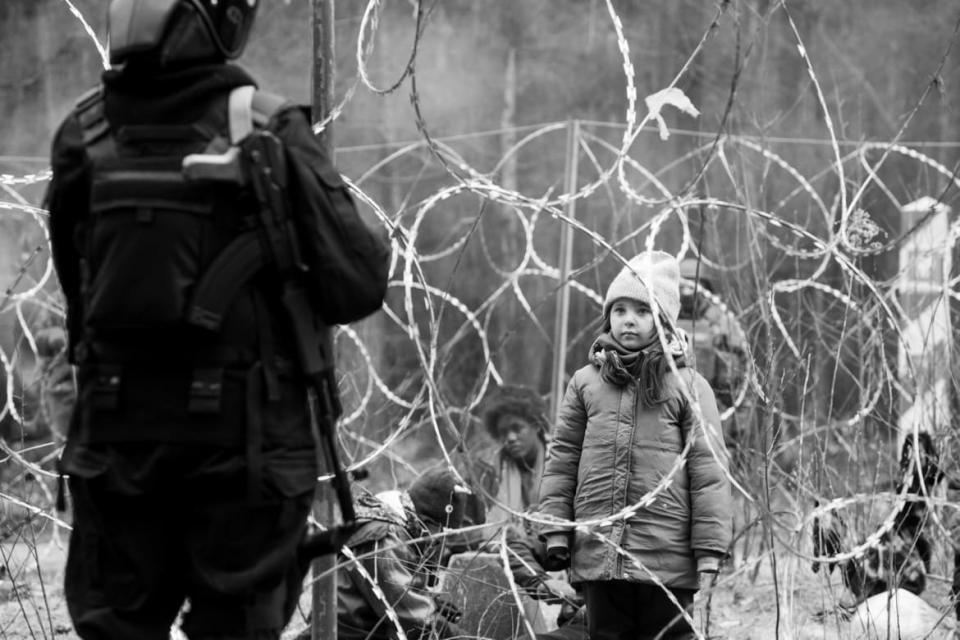‘Green Border’ May Be the Year’s Most Harrowing Film

- Oops!Something went wrong.Please try again later.
- Oops!Something went wrong.Please try again later.
Among her numerous achievements, Polish auteur Agnieszka Holland helmed multiple excellent episodes of HBO’s The Wire, and she brings that series’ blend of docudrama realism and suspenseful urgency to Green Border, an impassioned portrait of men and women navigating a crisis without easy solution or foreseeable end. Screening at this year’s New York Film Festival, Holland’s latest is a tad distended, resulting in repetition that undercuts its power, even as it also shies away from presenting the larger forces at play in its calamity. Nonetheless, its anger is matched by its empathy, both which abound in its tale of woe set in the nightmarish region between Belarus and Poland.
Green Border opens with an aerial shot of its primary forest setting transitioning from color to ashy black-and-white, followed by a 2021 scene inside an airplane, whose passengers include a family of Syrians—father Bashir (Jalal Altawil), mother Amina (Dalia Naous), Amina’s father (Mohamad Al Rash), and their three children Nur (Taim Ajjan), Ghania (Talia Ajjan), and infant Mahir (Sebabastian Svaton)—as well as Afghanistan native Leila (Behi Djanati-Atai).
Aside from a late image of birds flying in V-shape formation, it’s the last time Holland’s film nears the heavens. Once they land in Belarus, the clan agrees to give Leila a lift on their way to Poland, which is the next stop on a journey intended to conclude in Switzerland. No sooner have they hit the road, though, than trouble materializes in the form of a driver who stops in a remote woodland spot beside armed soldiers, demands an additional $300 as ransom, and kicks them out of the vehicle, at which point they’re ushered under a barbed-wire fence into Poland.
This is harrowing but, when Leila confirms their location via a dwindling-battery cell phone, they’re all relieved and jubilant, since entering the EU is their goal. Fantasies of easy asylum, alas, are short-lived, as these characters soon become pawns in a geopolitical game of hot potato whose details they (and we) learn about in piecemeal fashion. Apparently, Belarus—on the orders of its president Alexander Lukashenko and, behind him, Vladimir Putin—has lured refugees to the country in order to literally dump them on Poland, thereby creating a humanitarian catastrophe.
‘Foe’: Paul Mescal and Saoirse Ronan Get Frisky While the World Ends
In turn, the increasingly right-wing Poland has responded by simply breaking its own laws and ordering soldiers to “pushback” migrants to Belarus. As one pregnant woman opines, the result is that the refugees are treated like a football, kicked back and forth in a never-ending cycle of misery, separation, violence and death.
Bashir, Amina and their family are the focus of Green Border’s opening section, with Holland’s up-close-and-personal depiction of their ordeal eliciting intense compassion and sympathy. Her goal, it’s clear, is to humanize as a counter to Poland and Belarus’ joint campaigns of dehumanization—something made overt by a Polish border guard commander who tells his underlings that refugees aren’t to be viewed as people but as Putin’s “weapons” against their nation.
One of those soldiers, Jan (Tomasz Włosok), soon takes center stage, providing an alternative POV on this disaster. Husband to a pregnant wife and in the midst of renovating their future home, Jan is tasked with doing Poland’s dirty work while his spouse is forced to contend with grocery store patrons, and social media videos that cast him and his military brethren as fascist monsters.

Working from Maciej Pisuk and Gabriela Łazarkiewicz-Sieczko’s keen-eyed script, Holland further expands her material’s purview by turning her attention to a group of activists, led by practical Marta (Monika Frajczyk) and her combative sister Zuku (Jasmina Polak), who risk their own safety by sneaking into this forbidden area and aiding at-need refugees. That does not, however, extend to actually spiriting them out of the forest, since the risk is too great.
Like the foreigners trying to reach Poland, the activists are hemmed in by an inescapable Catch-22: sanctuary is only attainable via formal channels, but activating those official processes alerts the border patrol, which then promptly relocates the refugees (illegally) in Belarus. In such a bleak scenario, the sole remaining option is to take one’s chances by fleeing, yet as Leila and Nur learn in the film’s most heartbreaking sequence, that too carries with it potentially dire consequences from which there is no coming back.
Bolstered by unaffected and moving performances, Green Border additionally fixates on a psychiatrist named Julia (Maja Ostaszewska) who lives near the “exclusion zone” and, following a traumatic incident, chooses to join the activists in their cause. Holland captures this agonizing insanity from numerous, riveting angles, with Tomasz Naumiuk’s monochromatic cinematography throwing horrors into sharp, stark relief. The director deliberately keeps her nose to the ground, the better to amplify her story’s immediacy. That approach, though, costs the film a sense of the incendiary economic, cultural, and political factors that have begat this emergency. Fleeting radio broadcasts and dialogue snippets dispense enough contextual information to prevent things from devolving into confusion, but the absence of an additional corridors-of-power chapter allows the proceedings to pull at the heartstrings without grappling with complicating big-picture concerns.
Emma Stone Will Blow Your Mind in ‘Poor Things’
At the same time, the film’s second half says little that its first half didn’t already make plain. Holland’s pressing direction is infused with such righteous rage and sorrow that Green Border is never boring or didactic, and there are moments of stunning ugliness, as when Jan and a patrol mate stumble upon a forest corpse and choose to toss it over the fence into Belarus before they’re spotted (and fired at by) their adversarial neighbors. Still, it eventually hits the same notes over and over, which proves frustrating precisely because it has the unintended effect of narrowing, rather than magnifying, its perspective. The same can be said about a 2022 epilogue that hammers home its overarching political point and, in doing so, diminishes its messy complexity.
So furious is Holland’s drama that, the further it hurtles down its various paths to hell, it shrinks rather than swells. That may keep it from consistently reaching the soaring emotional heights it seeks, yet in a strange way, it also feels right for a contemporary tragedy about the contraction of hope.
Liked this review? Sign up to get our weekly See Skip newsletter every Tuesday and find out what new shows and movies are worth watching, and which aren’t.
Get the Daily Beast's biggest scoops and scandals delivered right to your inbox. Sign up now.
Stay informed and gain unlimited access to the Daily Beast's unmatched reporting. Subscribe now.

